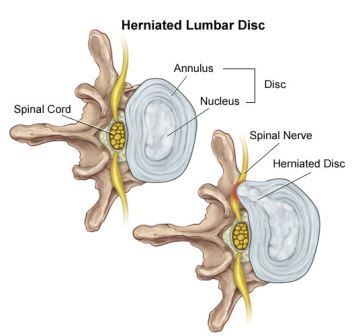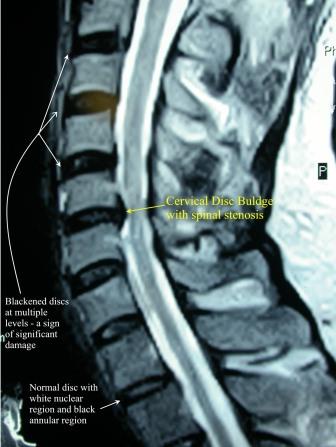Does your back and leg pain intensify when you bend, sneeze or cough?
A common cause of lower back and leg pain is a lumbar ruptured disc or herniated disc, commonly known as slipped disc. Symptoms of a slipped disc may include dull or sharp pain, muscle spasm or cramping, sciatica, and leg weakness or loss of leg function. Sneezing, coughing, or bending forward usually intensify the pain.
Rarely bowel or bladder control is lost, and if this occurs, seek medical attention at once.
First, a brief overview of spinal anatomy so that you can better understand how a lumbar herniated disc can cause lower back pain and leg pain.
In between each of the 5 lumbar vertebrae (bones) is a disc—a tough fibrous shock-absorbing pad. Endplates line the ends of each vertebra and help hold individual discs in place. Every disc has a tire-like outer band (annulus fibrosus) that encases a gel-like substance (nucleus pulposus).

When a disc herniates, it can press on the spinal cord or spinal nerves. All along your spine, nerves are branching off from the spinal cord and travelling to various parts of your body (to help you feel and move). The nerves pass through small passageways between the vertebrae and discs, so if a herniated disc presses into that passageway, it can compress (or “pinch”) the nerve. That can lead to the pain associated with herniated discs.
Many factors increase the risk for disc herniation:
- Lifestyle choices such as tobacco use, lack of regular exercise, and inadequate nutrition substantially contribute to poor disc health.
- As the body ages, natural biochemical changes cause discs to gradually dry out, which can affect disc strength and resiliency. In other words, the aging process can make your intervertebral discs less capable of absorbing the shock from your movements, which is one of their main jobs.
- Poor posture combined with the habitual use of incorrect body mechanics stresses the lumbar spine and affects its normal ability to carry the bulk of the body’s weight.
Combine these factors with the affects from daily wear and tear, injury, incorrect lifting, or twisting and it is easy to understand why a disc may herniate.
Most of the time the symptoms (especially the pain) prompt the patient to seek care. A visit with the doctor usually includes a physical exam and neurological exam. He or she will also review your medical history, and ask about what symptoms you’ve experienced and what treatments you’ve tried for pain relief.
An x-ray may be needed to rule out other causes of back pain such as osteoarthritis (spondylosis) or spondylolisthesis.

To treat a herniated disc, your chiropractor will develop a treatment plan that may include spinal adjustments—and other chiropractic techniques to help ease your herniated disc symptoms. This will be an individualized treatment plan, but it may include inversion therapy, deep tissue remedial massage and specific therapeutic exercises.
The specifics of what’s in your treatment plan are particular to your pain, level of activity, overall health, and what your chiropractor thinks is best.
As with any treatment option, don’t hesitate to ask questions about what chiropractic treatments are being recommended and why. You want to make sure you understand what will be done and how it can help relieve your pain. Chiropractic treatment is gentle and effective for most patients.
Here’s the good news: In 4 to 6 weeks, the majority of patients find their symptoms are relieved without surgery.
There are several factors that are within your control to help prevent disc issues. Take good care of your spine, watch your posture, don’t smoke, make healthy food choices, exercise, and use good body mechanics, especially when you’re lifting something.
Doing all of those things won’t guarantee that you never get a slipped disc, but they are generally healthy steps you can take to try to prevent lower back pain caused by a herniated disc.
60 years of
Experience & Practice
Discovering & treating the cause of your problems
Increase your function & be the best version of you
Our Services

Chiropractic
A health care profession concerned with the diagnosis, treatment and prevention of disorders of the neuromusculoskeletal system and the effects of these disorders on general health. There is an emphasis on manual techniques, including joint adjustment and/or manipulation with a particular focus on subluxations.

Remedial Massage
If you have particular muscle tension or chronic pain a remedial massage may be for you. Your remedial massage therapist will assess where you need treatment and what may be causing your pain. They’ll perform some tests to see exactly which muscles are giving you trouble and will tailor a treatment plan to suit.
$49 Initial Consult Offer
Come in for your Discovery Process to find out what are the causes of your symptoms.
Includes:
- Thorough consultation
- X-Rays
- Explanation of results
- Digital Postural Assessment

